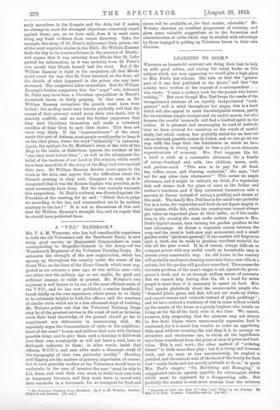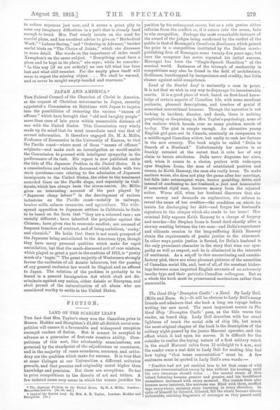LEARNING TO COOK.* WRITERS on household economy are doing their
best to help us with good advice, and among the many books on this subject which are now appearing we would give a high place to Mrs. Peel's last volume. She tells us that the "greater part of it was first published in the Queen," and that "the articles were written at the request of a correspondent . . . who wrote : 'I want a cookery book for the person who knows nothing.'" But even though Mrs. Peel keeps the needs of the inexperienced mistress of an equally inexperienced " cook- general " well in mind throughout her pages, this is a book which will also appeal to more knowledgeable women, partly for its excellent simple receipts and its useful menus, but also because the careful housewife will find a kindred spirit in the author. It is pleasant and encouraging to read of methods that we have evolved for ourselves as the result of careful study, but which custom has probably staled for us, here set out as the best possible course to follow, and we can go on our way with the hope that the foundation on which we have been working is strong enough to bear a yet more elaborate superstructure of economy. Mrs. Peel suggests us. Gd. a bead a week as a reasonable allowance for a family of seven—husband and wife, two children, nurse, cook, and parlour-maid. "This sum is to pay for all food, tea, coffee, cocoa, and cleaning materials," she says, "but not for any other item whatsoever." This seems an ample allowance, and it might be reduced, we think, if a vegetarian dish and cheese took the place of meat at the father and mother's luncheon, and if they contented themselves with a savoury at dinner instead of eating a pudding and cheese at this meal. The family Mrs. Peel has in her mind's eye probably live in a town, for vegetables and fruit do not figure largely in their menus, while fish, which the countryman cannot always get, takes an important place at their table; so if the reader lives in the country she must make certain changes in Mrs. Peel's typical menus, thus turning her garden produce to the best advantage. At dinner a vegetable course between the soup and the meat is both nice and economical, and a small garden and a" gardener-general," if our readers will forgive us such a word, can be made to produce excellent material for this all the year round. It is, of course, always difficult to compare prices with any useful result, as households vary in almost every conceivable way. An old house in the country will probably need more cleaning materials than a new villa in a suburb, but the garden will produce more food. Then comes the intricate problem of the man's wages to set against the green- grocer's book, and so on through endless mazes of accounts. But we cannot help feeling that lie. Gd. a head for seven people is more than it is necessary to spend on food. M ra. Peel speaks plaintively about the unreasonable people who "demand joints, game, and fish, will not eat made-up dishes, and expect creams and custards instead of plain puddings "; and we have noticed a tendency of late in some writers to bold up the master of the house as a greedy bugbear who insists on living on the fat of the land, even in war time. We cannot, however, help suspecting that the mistress may not always be free from blame where unnecessarily expensive food is concerned, for it is much less trouble to order an appetizing little meal without counting the cost than it is to arrange an attractive and wholesome one, in which all the ingredients have been considered from the point of view of price and food- value. This is real work ; the other method of "ordering dinner" is little more than play ; but it is tiring and tiresome work, and so, more or less unconsciously, its neglect is justified, and the natural wish of the head of the family for food that "really feeds and not merely pretends to do so," to quote Mrs. Peel's chapter "On Marketing and Managing," is exaggerated into an ogreish appetite for extravagant dishes which must be appeased by a disapproving wife. But probably the master is even more anxious than the mistress • Learning to Cook the Book of " Hon " and " IVh1: "n the Kitchen. By Mrs. C. S. reel. London: Constable and Co. Ps. 6(1,1 to reduce expenses just now, and it seems a great pity to raise any imaginary difficulties in a path that is already hard enough to tread. Mrs. Peel wisely insists on the need for careful plans, and has excellent advice to give on "Methodical Work," "Labour Saving," and" Ordering in Advance," besides useful hints on "The Choice of Joints," which she discusses in some detail. Her words on the importance of order recall Xenophon's on the same subject. "Everything must have a place and be kept in its place," she says ; while he remarks : "In this way [if we are orderly] we can tell what has been lost and what still remains. For the empty place itself will seem to regret the missing object. . . . We shall be warned, and so never be caught empty-handed and unawares."



































 Previous page
Previous page